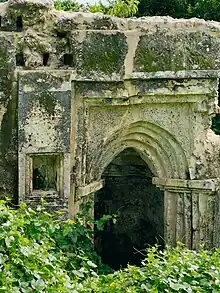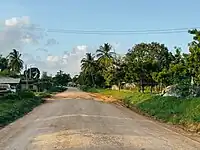Kimbiji
Kimbiji (Kata ya Kimbiji, in Swahili) is an administrative ward in the Kigamboni district of the Dar es Salaam Region of Tanzania. The Indian Ocean borders the ward on its eastern side. Pembamnazi to the south and Kisarawe II to the west form its borders. The ward is bordered by Somangila to the north. The ward is home to the Kimbiji Ruins a National Historic Site. Kimbiji is named after said Medieval Swahili settlement in the ward.[1] According to the 2002 census, the ward has a total population of 6,411.[2]
Kimbiji
Kata ya Kimbiji (Swahili) | |
|---|---|
   From top to bottom: Beach in Kimbiji ward, Historic Kimbiji Ruins & town scene in Kimbiji | |
| Nickname: The historic ward | |
| Coordinates: 6°59′31.92″S 39°31′52.68″E | |
| Country | |
| Region | Dar es Salaam Region |
| District | Kigamboni District |
| Area | |
| • Total | 59.3 km2 (22.9 sq mi) |
| Population (2012) | |
| • Total | 6,411 |
| Ethnic groups | |
| • Settler | Swahili |
| • Ancestral | Zaramo |
| Tanzanian Postal Code | 17101 |
Administration
The postal code for Kimbiji Ward is 17101.[3] The ward is divided into the following neighborhoods (Mitaa)/Villages (Vitongoji):
|
|
Government
The ward, like every other ward in the country, has local government offices based on the population served.The Kimbiji Ward administration building houses a court as per the Ward Tribunal Act of 1988, including other vital departments for the administration the ward.[4] The ward has the following administration offices:
- Kimbiji Ward Police Station
- Kimbiji Ward Government Office (Afisa Mtendaji)
- Kimbiji Ward Tribunal (Baraza La Kata) is a Department inside Ward Government Office
In the local government system of Tanzania, the ward is the smallest democratic unit. Each ward is composed of a committee of eight elected council members which include a chairperson, one salaried officer (with no voting rights), and an executive officer. One-third of seats are reserved for women councillors.[5]
Demographics
Like much of the district, the ward is the ancestral home of the Zaramo people. The ward evolved into a cosmopolitan ward as the city progressed over time. 6,411 people lived in the ward as a whole in 2012.[6]
Education and health
Education
The ward is home to these educational institutions:[7]
- Kimbiji Primary School
- Kijaka Primary School
- Kwa Chale Priamry School, Kibada
- Destine Primary School, Kibada
- Bohari Primary School
- Idian Primary School
- Kimbiji Secondary School
See also
References
- de Vere Allen, James (1981). "Swahili Culture and the Nature of East Coast Settlement". The International Journal of African Historical Studies. 14 (2): 306–334. doi:10.2307/218047. JSTOR 218047.
- "2002 Population and Housing Census General Report". Government of Tanzania. Archived from the original on 2008-04-27. Retrieved 2008-08-21.
- "Kimbiji Postal Code". Retrieved 2023-05-16.
- "Ward Tribunal Act 1988". Retrieved 19 March 2023.
- "Local Government System" (PDF). Retrieved 19 March 2023.
- "Kigamboni District Profile 2019" (PDF). The Kigamboni Municipal Council. Retrieved 2023-05-16.
- "Kigamboni District Profile 2019" (PDF). The Kigamboni Municipal Council. Retrieved 2023-05-16.
- "Health Institutions". Retrieved 2023-05-16.